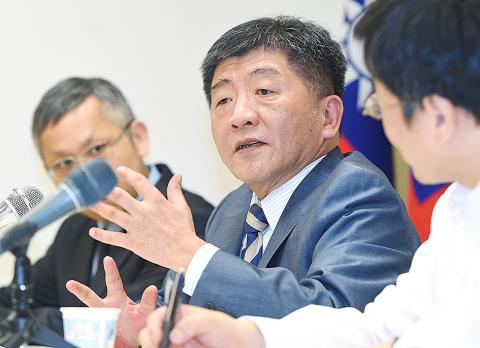Despite the lack of an official invitation, a Taiwanese delegation is to leave at midnight tomorrow for the World Health Assembly (WHA) in Geneva, Switzerland, the Ministry of Health and Welfare said yesterday.
The government will work with health and medical associations from around the world to host forums outside the assembly meeting that focus on issues related to antibiotic resistance, dental care for elderly patients and strengthening healthcare systems, said Minister of Health and Welfare Chen Shih-chung (陳時中), who is to lead the delegation.
The topic of this year’s WHA meeting is universal health coverage and as Taiwan is a world leader in universal health coverage, it us to jointly host with the World Medical Association a forum on the topic, he said.

Photo: Liao Chen-huei, Taipei Times
Chen also responded to a statement by China’s Taiwan Affairs Office yesterday, which said that Taiwan did not receive an invitation because the Democratic Progressive Party government refuses to acknowledge the so-called “1992 consensus,” and accused Taiwan of “playing the sympathy card” to gain support from other nations.
“We are going to the WHA to make contributions and are not playing the ‘sympathy card,’” Chen said. “We are playing the ‘anger’ and ‘soft power’ cards. [China] should not use politics to harm the interests of Taiwanese.”
The “1992 consensus” refers to a tacit understanding between the Chinese Nationalist Party (KMT) and the Chinese Communist Party that there is “one China,” with each side having its own interpretation as to what “China” means.
The government is dissatisfied and disappointed at the lack of an invitation, Chen said, adding that the nation’s allies are to make strongly worded statements at the assembly to protest the decision to exclude Taiwan.
Nevertheless, the delegation would seek to have more exchanges with healthcare officials worldwide to teach more nations about Taiwan’s medical achievements, Chen said.
Although Taiwan is not a WHO member, it would score 85 points on the organization’s public risk indicator, which would place it in the same category as Japan, South Korea, Canada, Singapore and other nations with quality healthcare systems.
“If I run into the WHO secretary-general this year, I will directly ask him why his organization decided to disregard the health of 23 million Taiwanese,” Chen said.

Tropical Storm Gaemi strengthened into a typhoon at 2pm yesterday, and could make landfall in Yilan County tomorrow, the Central Weather Administration (CWA) said yesterday. The agency was scheduled to issue a sea warning at 11:30pm yesterday, and could issue a land warning later today. Gaemi was moving north-northwest at 4kph, carrying maximum sustained winds near its center of up to 118.8kph and gusts of 154.8kph. The circumference is forecast to reach eastern Taiwan tomorrow morning, with the center making landfall in Yilan County later that night before departing from the north coast, CWA weather forecaster Kuan Shin-ping (官欣平) said yesterday. Uncertainty remains and

SEA WARNING LIKELY: The storm, named Gaemi, could become a moderate typhoon on Wednesday or Thursday, with the Taipei City Government preparing for flooding A tropical depression east of the Philippines developed into a tropical storm named Gaemi at 2pm yesterday, and was moving toward eastern Taiwan, the Central Weather Administration (CWA) said. Gaemi could begin to affect Taiwan proper on Tuesday, lasting until Friday, and could develop into a moderate typhoon on Wednesday or Thursday, it said. A sea warning for Gaemi could be issued as early as Tuesday morning, it added. Gaemi, the third tropical storm in the Pacific Ocean this typhoon season, is projected to begin moving northwest today, and be closest to Taiwan on Wednesday or Thursday, the agency said. Today, there would likely

DISRUPTIONS: The high-speed rail is to operate as normal, while several airlines either canceled flights or announced early departures or late arrivals Schools and offices in 15 cities and counties are to be closed today due to Typhoon Gaemi, local governments announced last night. The 15 are: Taipei, New Taipei City, Taoyuan, Tainan, Keelung, Hsinchu and Kaohsiung, as well as Yilan, Hualien, Hsinchu, Miaoli, Chiayi, Pingtung, Penghu and Lienchiang counties. People should brace for torrential rainfall brought by the storm, with its center forecast to make landfall on the east coast between tonight and tomorrow morning, the Central Weather Administration (CWA) said. The agency issued a sea warning for the typhoon at 11:30pm on Monday, followed by a land warning at 11:30am yesterday. As of

CASUALTY: A 70-year-old woman was killed by a falling tree in Kaohsiung as the premier warned all government agencies to remain on high alert for the next 24 hours Schools and offices nationwide are to be closed for a second day today as Typhoon Gaemi crosses over the nation, bringing torrential rain and whipping winds. Gaemi was forecast to make landfall late last night. From Tuesday night, its outer band brought substantial rainfall and strong winds to the nation. As of 6:15pm last night, the typhoon’s center was 20km southeast of Hualien County, Central Weather Administration (CWA) data showed. It was moving at 19kph and had a radius of 250km. As of 3pm yesterday, one woman had died, while 58 people were injured, the Central Emergency Operation Center said. The 70-year-old